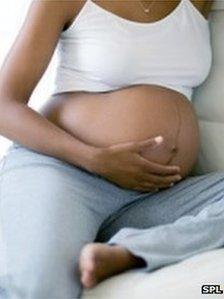Wales maternity care warning by Royal College of Midwives
- Published

Maternity services are 'on watch,' says the Royal College of Midwives
Deteriorating maternity services in Wales must be turned around without delay, midwives have warned.
The Royal College of Midwives (RCM) says there is a shortage of midwives and a fall in students and any future cuts will risk the quality of services.
The Welsh government said the number of midwifery training places commissioned rose again this year.
It also said all maternity units must meet recommendations on the number of midwives needed for safe services.
It is the second year the RCM has carried out a State of Maternity Services report , externalacross Wales, England, Scotland and Northern Ireland.
"Wales saw a trimming of training numbers in 2011/12 compared to the previous year. It is for this reason, and the fall in midwife numbers there, that the RCM is putting Wales on watch," the report said.
"We are not yet ringing the alarm bell, but we are poised to do so; decision-makers in Wales must turn this deteriorating situation around."
It went on that the the shortage of midwives that has emerged needs to be "eliminated without delay".
"The government in Cardiff should act now," the report said. "The shortage we have identified in Wales should be easily eliminated - and we call on the government in Wales to do just that.
"Given the emerging shortage of midwives in Wales, the number of student midwife places needs to be sustained; any further cuts would put the future quality of maternity services at risk."
Midwife numbers fell in Wales in the last annual survey in 2011, where figures were 12% lower than in 2008, and the RCM said it was the third year in a row in which the number of midwives working in the NHS in Wales was cut.
"Between 2001 and 2011 whilst the number of babies born jumped by just short of 5,000, the number of full-time equivalent midwives rose by just 35.
"In last year's State of Maternity Services report we reported on an emerging shortage of midwives in Wales. We believe that this remained in 2011; whilst the number of births dropped a little, the number of midwives dropped too."
However, Wales has seen a 34% drop in births to girls aged under 16.
In England, the number of NHS midwives has continued to climb because of the UK government's good work, according to the report.
A Welsh government spokesperson said: "The numbers of midwifery training places commissioned has increased again this year from last year's numbers.
"Decisions about training places are based on what the NHS needs to maintain services, service development, the numbers and age profile of staff and the drop-out rate from the courses. Clearly, plans also take into account the student midwives who are already in training and when these are expected to graduate and enter the workforce.
"NHS organisations are responsible for ensuring that they have the appropriate number of staff and skill mix to meet fluctuating demand. Since 1999, the maternity workforce, including midwives and midwifery support workers, has increased by 12% in Wales.
"We require all maternity units in Wales to comply with Birth Rate Plus - as recommended by the Royal College of Midwives - on the number of midwives required to deliver safe services."
- Published21 January 2013
- Published19 January 2013
- Published18 January 2013
- Published20 September 2011